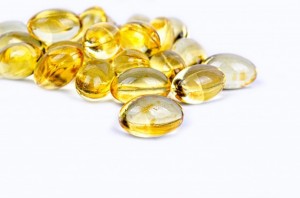Researchers at the University of Colorado Cancer Center have found that vitamin D can help block a protein that causes prostate tumors to grow. Published in the journal Prostate, they discovered that inflammation may be the link between vitamin D and prostate cancer. They found that the gene GDF-15 – known to be up-regulated by vitamin D – can help block NFkB – a protein which stimulates tumor growth.
According to the American Cancer Society:
- Prostate cancer is the second leading cause of death in American men.
- Other than skin cancer, prostate cancer is the most common type of cancer among men in the United States.
- About 1 in 7 men will be diagnosed with prostate cancer during his lifetime.
- African-American men are more likely to be diagnosed at an advanced stage and more than twice as likely to die from the disease.
- Having a family history of prostate cancer more than double’s a man’s risk of developing the disease.

Why we need vitamin D: Our skin makes vitamin D when it is exposed to sunlight. We must get vitamin D to absorb calcium which promotes bone growth and helps maintain bone density. Too little vitamin D can lead to weak bones in both children and adults. Past studies have suggested that low vitamin D levels are associated with very aggressive prostate cancers. However, we never knew
exactly how vitamin D could prevent certain cancers.
Read about Joe Torre’s Prostate Cancer campaign: Click Here
James Lambert, investigator at the University of Colorado Cancer Center, said: ‘When you take vitamin D and put it on prostate cancer cells, it inhibits their growth. But it hasn’t been proven as an anti-cancer agent. We wanted to understand what genes vitamin D is turning on or off in prostate cancer to offer new targets.”
Why inflammation matters: Inflammation is known to be associated with the development of many cancers including prostate, cervical, liver, and colon cancer. Inflammation is the body’s response to tissue being damaged as a result of injury, infection, or exposure to toxins. The inflammatory response causes the damaged cells to repair themselves and promotes cell growth at the injured site. However, if inflammation persists, it can become chronic and in turn create an environment that is favorable for the development of cancer. Studies have suggested that vitamin D inhibits inflammation.
Researchers at the UC Cancer Center decided to take a closer look at vitamin D as an anti-cancer agent. In doing so, they discovered a link between the following:
Vitamin D → activates GDF-15 → blocks NFkB → inhibits inflammation → tumor growth
Using a sophisticated computer algorithm, researchers analyzed samples of prostate cells and compared them to the prevalence of GDF-15 and inflammatory cells. Because they were able to demonstrate that vitamin D up-regulates the gene expression for GDF-15, they decided to further investigate to see if GDF-15 could be a pathway in which vitamin D inhibits prostate tumor growth.
The study showed that gene GDF-15 blocked NFkB – a protein which drives inflammation and encourages the growth of tumors. Until now, scientists have only known that NFkB could aggravate cancer. “There’s been a lot of work on inhibiting NFkB,” says Lambert. “Now from this starting point of vitamin D in prostate cancer, we’ve come a long way toward understanding how we might use GDF-15 to target NFkB, which may have implications in cancer types far beyond prostate.” This new research suggests that using vitamin D to stimulate GDF-15 could potentially control prostate cancer in future patients.
Have you checked your vitamin D lately? If not, make sure to check if your levels are balanced with a 25-hydroxy vitamin D test – it’s a simple blood test. Your levels should be between 30 and 80 ng/mL. Low vitamin D levels can pose certain health risks including cancer, increased risk of death from cardiovascular disease, and cognitive impairment in older adults. On the other hand, taking too much Vitamin D can cause toxicity.
There are three sources of vitamin D: sunlight, food, and supplements. Sunlight and food are the best ways to get enough vitamin D. However, it’s important to be careful in sunlight due to the risk of skin cancer. If you aren’t getting enough from sunlight and food, consider taking a supplement – but only under the direction of your health care provider.
For those who have been diagnosed with or know someone who has been diagnosed with prostate cancer, call Dr. David Samadi at 212-365-5000 to discuss your optimal treatment plan. You can also visit ProstateCancer911.com, Women for Prostate Health on Facebook, or Robotic Oncology.
Source: American Cancer Society
To learn more about Men’s Health: Click Here
For Men’s Health Resources: Click Here



